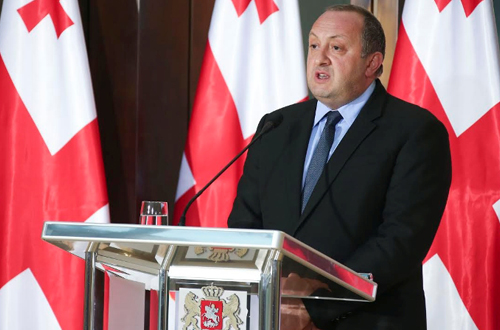
President Giorgi Margvelashvili announces decision rejecting referendum request in a presidential palace in Tbilisi, August 9, 2016. Photo: president’s office
President Giorgi Margvelashvili has rejected petition for a referendum on defining marriage as union of a man and a woman, saying that this issue is already specified in the Georgian legislation.
“The proposed formulation does not fall within the referendum because this issue is already defined by the Georgian legislation and it is already defined that marriage is a voluntary union of a man and a woman,” the President said on Tuesday evening, citing a clause from Georgia’s civil code.
“At the same time, the legislation bans adopting a law or a constitutional amendment through a [binding] referendum. If there is a desire to adopt a constitutional amendment over this issue, I completely agree with the Prime Minister, that a relevant bill should be considered by the Georgian Parliament,” Margvelashvili said.
In late July an initiative group behind the referendum proposal on defining marriage – something which is already specified in the Georgian legislation, presented to the Central Election Commission (CEC) signatures of more than 200,000 citizens, required for the referendum to move ahead.
The group, among others, also includes Sandro Bregadze, who was a deputy state minister for diaspora issues before resigning in February, 2016; the rights groups had been calling for his dismissal while he was holding the post because of his homophobic remarks.
On July 30 the CEC validated authenticity of signatures and sent the petition to the President on August 1.
President Margvelashvili had 30 days to decide whether to call the referendum.
When announcing about his decision, rejecting the referendum bid, President Margvelashvili also cited the Georgian legislation saying that the binding referendum can only be held on the entire territory of Georgia.
“When 20 percent of Georgia’s territory is occupied by Russia, when Georgia’s two occupied regions are recognized by Russia as ‘independent states’ – holding of a referendum in such conditions gives additional legal arguments to the occupying power,” Margvelashvili said.
The President was planning to meet with representatives of the initiative group, which was pushing for the referendum, late on Tuesday afternoon.
The meeting, however, was canceled by the President after few hours before the scheduled meeting the group behind the referendum bid threatened with protest rallies if the President rejected the referendum proposal.
The proposed question for a referendum – “Do you agree that civil marriage should be defined as the union of a man and a woman for the purpose of starting a family?” – was not specifying how the issue could have been further “defined” as Georgia’s civil code in fact already specifies that marriage is a “voluntary union of a man and a woman”, effectively banning same-sex marriage.
Initially the same initiative group was proposing different wording of the question, asking voters if they wanted the marriage to be defined as union of a man and a woman in the Constitution.
But such wording was declined by the Central Election Commission as holding of a binding referendum on an issue obligating the Parliament to change the Constitution could have been considered as violation of law on referendum.
In May, when the Parliament was debating GDDG ruling party’s proposal for a constitutional amendment to define marriage as union of a man and a woman, President Margvelashvili criticized the proposal as an attempt “to stir a storm in a teacup”; he also said that the proposal was floated for the purpose of diverting public attention from real problems in the country.
Meanwhile, a counter-campaign by some civil society groups and rights activists was underway calling on the President to reject the referendum on what they called was a non-issue; they were saying that such a referendum would have further marginalized LGBT community and increased homophobic sentiments.

 RSS
RSS Mobile
Mobile Twitter
Twitter Facebook
Facebook